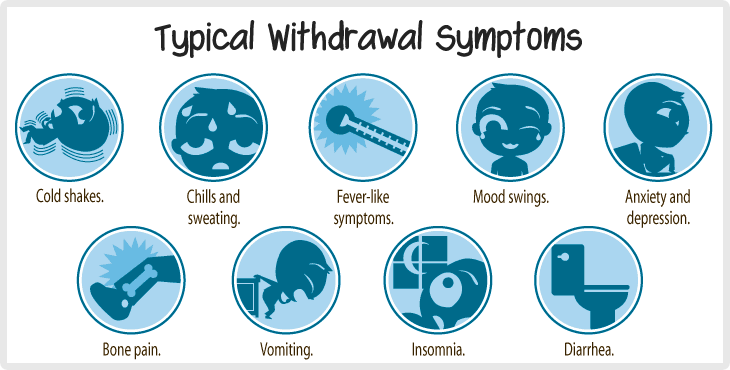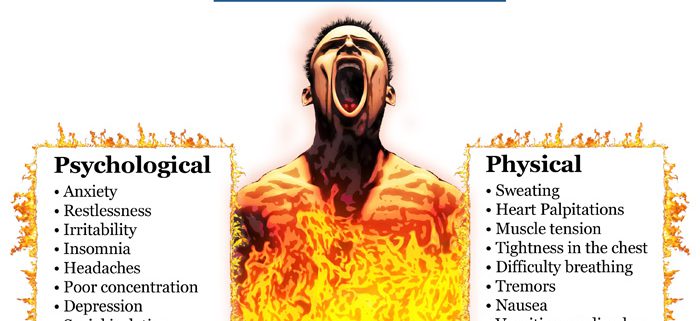Withdrawal involves termination of a medical treatment, for example, to stop using a particular drug. Withdrawal symptoms are different symptoms that may occur after (often transient) discontinuation of drug treatment. There is almost no evidence-based research on withdrawal symptoms, and current knowledge of the relationship between release and symptoms is instead based on clinical experience.
Society thinks that people addicted to substances can stop using these drugs whenever they want to. In all truth, they simply cannot. Why is this? Because of the withdrawal symptoms they experience during the detox phase in some cases can be life threatening.

Abstinence is the characteristic signs and symptoms that occur when a substance that causes physical addiction is used for a prolonged period of time and then abruptly to be discontinued or reduced dosage.
What are withdrawal symptoms?
Alcohol withdrawal are seen by symptoms that can be seen when a person reduces or cuts out alcohol consumption after prolonged periods of high alcohol intake. Excessive alcohol abuse leads to tolerance and physical addiction. Abstinence is mainly due to the central nervous system being in a hyper-excitable condition. Alcohol withdrawals can be fatal along with withdrawal from other sedatives or hypnotics such as barbiturates and benzodiazepines through direct glutamate excitotoxicity. It can also be fatal with opioid withdrawal, which may be fatal at elevated heart rate and blood pressure along with electrolyte imbalance and malnutrition.
Abstinence may include convulsions and delirium tremens , and may lead to extraneous neurotoxicity. Sedatives / hypnotics like alcohol are well known for their inclination to induce physiological addiction. Alcohol bristles occur as a result of addiction due to chronic exposure to alcohol. A withdrawal syndrome occurs at decreasing levels of alcohol in the blood. This can be alleviated by new alcohol or a cross-tolerant drug. The alcoholic stomach is characterised by neuropsychiatric excitability and autonomic disturbances seen in other sedative-hypnotic drugs. Addiction to other sedatives / hypnosis increases the severity of withdrawal symptoms.
Craving is the extreme appetite (for example in narcotics). Craving is especially common in people who are kicking off heroin or cocaine . A substitute for methadone, for example, is used to reduce heroin addiction, but during this period a (former) drug addict often has extreme needs to start using again. One of the complaints that occur during craving are then physical complaints such as flu symptoms and psychological complaints such as anxiety , insomnia and extreme dreams.. It is precisely during this period that many addicts who follow a rehabilitation trajectory have an extreme appetite for narcotics to suppress these complaints.
Craving is especially common in addicts who are forced to kick off in prison. Because detained addicts often face setbacks, such as refusing leave etc., this group is tempted to start using again. Because of these setbacks, most detained addicts will use again after their detention.
The types of withdrawal symptoms that will be experienced are dependent on these factors:
- What type of drug is being used?
- How long has the drug been used?
- How much of the drug have they been using?
All of these questions need to be truthfully answered in order to correctly assess the severity of the withdrawal symptoms a person may experience.
Addicts in the process of quitting drugs and alcohol need to be carefully monitored by medical professionals. For example, if an alcoholic stopped using alcohol without supervision, they might experience a condition such as delirium tremens, which is a condition that causes symptoms sweating, nausea, anxiety and more severely, death.
That’s why one of the the best ways to treat any addiction is by getting professional help in a drug or alcohol rehabilitation centre, where a fully supervised medical detox process will be performed to minimise the effects of any and all withdrawal effects that could be experienced in the treatment.
Addicts will receive 24-hour medical care under the watchful eyes of the qualified staff at the rehab centre and will go through various forms of counselling and therapy, such as group meetings and individual counselling to help educate the individuals about their addiction issues and what can be done to prevent further drug or alcohol use in their future when outside of rehab.


